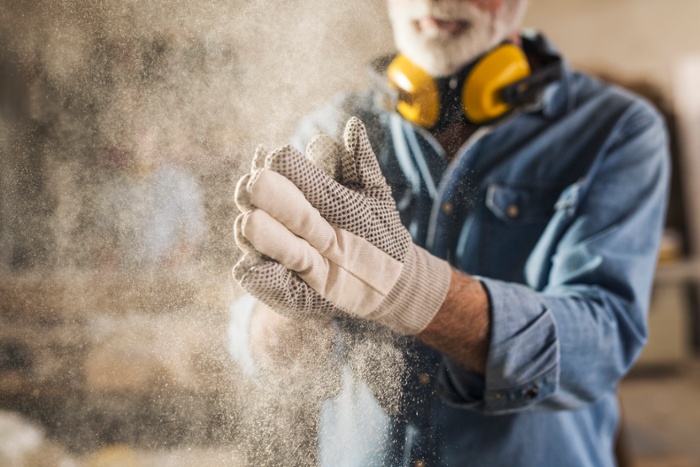A recent explosion in an American wastewater treatment facility has been deemed ‘accidental’, after ignited dust sparked a thermal oil fire and explosion, which damaged the facility. Investigators also noted poor housekeeping in other areas of the facility (1).
When dealing with dangerous goods and hazardous chemicals, ‘housekeeping’ does not always garner the attention it deserves. To maintain safety and compliance, effective housekeeping practices must be upheld so that the chemical controls, and the workplace in general, can operate to maximum efficacy.
The inspection and maintenance of your workplace and chemical controls is an integral part of the chemical risk management process. Under WHS law, workplaces are obliged to inspect and maintain controls, so the systems continue to provide risk reduction in the most effective manner.
However, there are many workplace incidents which have been attributed to poor housekeeping:
An explosion in a Georgia sugar refinery was found to have occurred when a ‘snowlike’ accumulation of industrial dust ignited within the refinery, killing 12 people (2).
A powered metals plant in Gallatin, Tennessee, exploded when particles of iron dust ignited. Sadly, two staff died due to injuries sustained in the explosion (3)
In Australia, a Victorian power station caught fire when coal dust in a bunker ignited due to the hot, dry weather conditions. Extensive damage in and around the area was sustained, but there were no fatalities (4).
These tragic accidents are all, sadly, preventable. With increased monitoring of health and safety onsite, as well as the development of diligent housekeeping practices, incidents like these could have been avoided.

Dust and airborne contanminants must be monitored and controlled to avoid hazards.
Housekeeping Duties
Under WHS law, organisations are required to maintain a safe working environment, with controls to minimise hazards. In addition to the implementation of controls, you must also maintain and review these controls to ensure they are providing protection for your people, place and property.
Subdivision 4 Storage and handling systems
363 Control of risks from storage or handling systems
(1) A person conducting a business or undertaking at a workplace must ensure, so far as is reasonably practicable, that a system used at the workplace for the use, handling or storage of hazardous chemicals:
(a) is used only for a purpose for which it was designed, manufactured, modified, supplied or installed; and
(b) is operated, tested, maintained, installed, repaired and decommissioned having regard to the health and safety of workers and other persons at the workplace.
- Model WHS Regulations
Housekeeping duties at your workplace may include:
-
Minimisation of combustible materials, to reduce impact of a potential fire
-
Identification and isolation of ignition sources, incompatible substances and other hazards
-
Notification, containment and clean-up of hazardous chemical spills
-
Cleaning of any natural or mechanical ventilation systems to ensure uninhibited airflow
-
Cleaning and disposal of waste products
-
Reduction of dust and other airborne contaminants
-
Minimisation of chemical vapours with proper cleaning, handling and storage practices
-
Cleaning and activation of safety showers and emergency eye wash stations
-
Adjustment, replacement or cleaning of dangerous goods and hazard signage, to ensure visibility
-
Changing of light bulbs or cleaning of lights to maintain visibility
-
Keeping safety data sheets, manifests and register of hazardous chemicals clean and organised, in the designated location
Developing Systems for Safety
Worksafe (5) advises that poor housekeeping is a sign of unclear systems for storage, maintenance and cleaning. In addition to this, a lack of comprehension about the hazards at the worksite, may also lead staff to practice poor or insufficient housekeeping.
Some examples of poor housekeeping accidents may include:
-
Slipping, falling or tripping over: due to substances spilled, equipment, uneven floors, poor lighting etc.
-
Respiratory issues with staff due to a build up of airborne contaminants: caused by open chemical containers, dust build up, poor ventilation system management etc.
-
Fire, explosion or chemical reactions: due to staff not following the correct procedures with dangerous goods and hazardous chemicals in the workplace
Housekeeping to Increase Control Effectiveness
Housekeeping procedures for dangerous goods storage and handling equipment must be performed to make sure the equipment is working as it should.
We suggest, at a minimum:
- Emptying, cleaning and decontaminating the spill sump of your cabinets or outdoor stores
- Wiping down shelves and interiors from chemical residue
- Checking that no combustibles are stored on, in or near the cabinet or store
- If there is no mechanical ventilation system, make sure the vent bung is in place on your cabinet
- Stack and load the cabinet so that the doors and self-closing mechanism operate correctly
- Wipe down signage and replace when aged or faded
- Making sure that the correct chemical class is in the cabinet and labels are intact
- Any airborne contaminants, chemical odours or other concerns are addressed immediately
Maintaining Compliance
The role of housekeeping in compliance must not be underestimated. While chemical controls are crucial to workplace safety, it’s how you inspect, use and maintain your systems that can affect the ongoing compliance of your site.
To learn more about chemical compliance, read our latest posts.
References:
(1) CBS News Baltimore
(2) The Augusta Chronicle
https://www.augustachronicle.com/story/news/2008/03/13/met-190839-shtml/14676403007/
(3) CSB
(4) Dust Safety Science
https://dustsafetyscience.com/power-plant-fire-yallourn-australia/
(5) WorkSafe QLD

Living life by the 4 C’s of marketing – communication, coffee, compliance… and more coffee – Leisa Andersen is Storemasta’s Content Marketing Manager. When she’s not writing, you’ll find her enjoying all the good things in life, including shopping, travel and gluten free donuts.